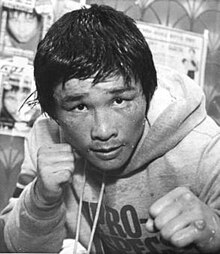Duk Koo Kim
| Kim Duk-Koo | |
|---|---|
 |
|
| Statistics | |
| Real name | Kim Deuk-Gu |
| Nickname(s) | "Gidae" (English: Hope) |
| Rated at | Lightweight |
| Nationality | South Korean |
| Born |
January 8, 1955 Goseong County, Gangwon Province, South Korea |
| Died | November 18, 1982 (aged 27) Desert Springs Hospital, Paradise, Nevada, U.S. |
| Stance | Southpaw |
| Boxing record | |
| Total fights | 20 |
| Wins | 17 |
| Wins by KO | 8 |
| Losses | 2 |
| Draws | 1 |
| No contests | 0 |
| Kim Duk-koo | |
| Hangul | 김득구 |
|---|---|
| Hanja | 金得九 |
| Revised Romanization | Gim Deuk-gu |
| McCune–Reischauer | Kim Tŭk-ku |
Kim Duk-Koo (January 8, 1955 – November 18, 1982) was a South Korean boxer who died following a world championship boxing match against Ray Mancini. His death sparked a number of reforms in the sport aimed to better protect the health of fighters, including reducing the number of rounds in championship bouts from 15 to 12.
Kim was born in Gangwon Province, South Korea, 100 miles east of Seoul, the youngest of five children. His father died when he was two and his mother married three more times. Kim grew up poor. He worked odd jobs such as a shoe-shining boy and a tour guide before getting into boxing in 1976.
After compiling a 29–4 amateur record, he turned professional in 1978. In February 1982, he won the Orient and Pacific Boxing Federation lightweight title and became the World Boxing Association's #1 contender. Kim carried a 17–1–1 professional record into the Mancini fight and had won 8 bouts by KO before flying to Las Vegas as the world's (WBA) number 1 challenger to world lightweight champion Mancini. However, he had fought outside of South Korea only once before, in the Philippines. It was his first time ever fighting in North America.
Kim was lightly regarded by the American boxing establishment, but not by Ray Mancini, who believed the fight would be a "war". Kim struggled to lose weight in the days prior to the bout so that he could weigh in under the lightweight's 135-pound limit. Before the fight, Kim was quoted as saying "Either he dies or I die." He wrote the message "live or die" on his Las Vegas hotel lamp shade only days before the bout (a mistaken translation led to "kill or be killed" being reported in the media).
Mancini and Kim met in an arena outside Caesars Palace on November 13, 1982. Mancini and Kim went toe to toe for a good portion of the bout, to the point that Mancini briefly considered quitting. Kim tore open Mancini's left ear and puffed up his left eye, and Mancini's left hand swelled to twice its normal size. After the fight Mancini's left eye would be completely closed. However, by the latter rounds, Mancini began to dominate, landing many more punches than Kim did. In the 11th he buckled Kim's knees. In the beginning of the 13th round Mancini charged Kim with a flurry of 39 punches, but had little effect. Sugar Ray Leonard (working as one of the commentators of the fight) said Kim came right back very strong. Leonard later declared the round to be closely contested. When the fighters came out for the 14th round, Mancini charged forward and hit Kim with a right. Kim reeled back, Mancini missed with a left, and then Mancini hit Kim with another hard right hand. Kim went flying into the ropes, his head hitting the canvas. Kim managed to rise unsteadily to his feet, but referee Richard Green stopped the fight and Mancini was declared the winner by TKO nineteen seconds into the 14th round.Ralph Wiley of Sports Illustrated, covering the fight, would later recall Kim pulling himself up the ropes as he was dying "One of the greatest physical feats I had ever witnessed."
...
Wikipedia
